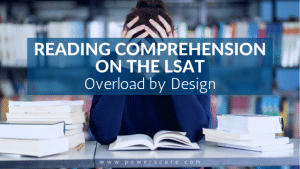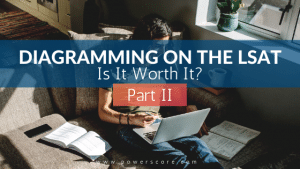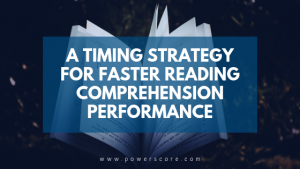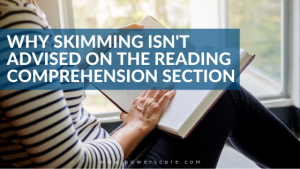The LSAT's Reading Comprehension passages are typically dense and convoluted. Clearly, it's not lazy summer beach reading. But what is the reason behind the design? Reading vs. Reading Comprehension When we read a passage, we're performing several mental processes all at once. For example, as we read a sentence, we identify individual words and combine them into phrases and sentences. An experienced and skilled reader, such as a law school … [Read more...]
Bored with Reading Comprehension? Maybe That’s the Problem
Reading Comp may be your worst section. Students often admit boredom with it; "hate" is a commonly used word. Nobody cares about Navajo weaving techniques, 18th century French female poets, or the !Kung people. Why should you? Here's why: Low Interest Reading A number of research studies show that test-takers who report a high level of interest in the topic of a passage also demonstrate higher levels of engagement with the text. The presence of … [Read more...]
How to Best Review LSAT Practice Questions
In another post, we outline exactly how to take LSAT practice tests. In this post, I'm going to examine in a bit more detail the process of performance review, specifically how to assess your progress in terms of your initial confidence about the answers you've chosen.The final note in practice test article above describes the importance of closely analyzing your results. "You need to perform a thorough post-test review, analyzing your … [Read more...]
Diagramming on the LSAT Part II – Notation Suggestions
In the first part of this series, I address LSAT diagramming and how to better determine its usefulness for you. Essentially, I suggest that diagramming is an investment of your time and rhythm. In order for that investment to be worthwhile, it needs to pay dividends in terms of two things:Gaining you more time than it took as you continue on. Like a prephrase, where you can more aggressively/efficiently sort through the answers. Leading … [Read more...]
Diagramming on the LSAT Part I: Is It Worth It?
When time is running out, students face a critical dilemma. It's one that I feel is important to briefly address as it is one of the most common elements that students find slows them down: diagramming. Make Sure It's Worth Your Time Here's the thing. Any time you find yourself stopping to make notations, for a passage, game, or stimulus, you're using valuable time. Theoretically, that time may be better spent. Maybe by continuing to … [Read more...]
Time Running Out in LSAT Reading Comprehension
When considering another post on our blog, Mind-Wandering, Mindfulness, and Reading Comprehension, some other RC concerns we hear from students come to mind. How do I approach the final passage when I'm running out of time? What is the best strategy for attacking a passage with only 3-5 minutes remaining in the section?Considering that the typical test taker needs 9-10+ minutes to get through a passage and its questions, this scenario is … [Read more...]
Mind-Wandering, Mindfulness, and Reading Comprehension
Struggling to Focus Does your mind drift away while you’re trying to focus on Reading Comprehension? It probably does, sometimes. Apparently, it’s a condition cognitive psychologists call “mind-wandering” – an attention lapse often referred to as engaging in “task unrelated thoughts.” Mind-wandering can be beneficial if your line of work benefits from inspiration and creative problem solving. Unfortunately, these are not among the most critical … [Read more...]
Should I Answer Questions on the LSAT In Order?
Many students don't take much time to consider the order in which they attack the questions on the LSAT, but the right strategic approach can be extremely valuable. For most test-takers, the natural inclination is to do all or most of the questions in order. However, there are quite a few benefits from a slightly more flexible approach to every section of the test.Logic Games Most students start the Logic Games section by diving right into … [Read more...]
LSAT Test Composition: How and Why Difficulty Varies
Struggling with Consistency? One question that arises frequently is, “Why am I not consistent in how I score on a certain section?” For example, a student may see his or her score in Logical Reasoning move around by a few questions with each practice test. Or, a student with consistent overall scores notices that sometimes she performs well on Reading Comprehension, other times Logical Reasoning, and other times Games. So, she ends up scoring … [Read more...]
A Timing Strategy for Faster Reading Comprehension Performance
Although people don't think that Reading Comprehension and Logic Games have much to do with each other, the truth is that they have something very important in common. The most obvious thing that the sections have in common is their structure. Both the sections have four main units. The Game section has four games and the Reading Comprehension section has four passages. And the number of questions associated with each game or passage is similar … [Read more...]
Assumption and Must Be True Questions: Strange Bedfellows
Must Be True Questions Must Be True (aka “Inference”) questions are foundational to both the Logical Reasoning and Reading Comprehension sections of the test. Most commonly, their question stem indicates that the information in the stimulus should be taken as true (“if the statements above are true…”). It then asks you to identify an answer choice that is proven or supported by it (“…which one of the following must also be true?”). All Must Be … [Read more...]
Don’t Be Fooled by Feigned Sophistication
There is a widespread misconception among test takers that because your reading level is difficult to improve (taking years to develop), your performance on the Reading Comprehension passages is also unlikely to change. This belief reflects a common misunderstanding about the specific type of difficulty associated with reading comprehension passages. Keep in mind that the test makers generally have about a half of a page to get their points … [Read more...]
Why Skimming Isn’t Advised on the Reading Comprehension Section
Should You Skim the Reading Comp Passage? In theory, it might seem that skimming could add some degree of efficiency. Unfortunately, in practice, this is not the case. In fact, this approach actually reflects a fundamental misunderstanding of the nature of the Reading Comprehension section.Skimming might be sufficient to absorb lighter materials aimed for simplicity, such as newspapers or magazines. A newspaper editor wants readers to know … [Read more...]













